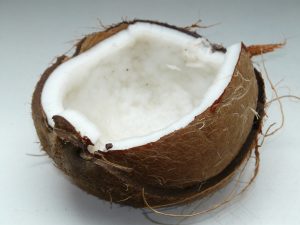Virgin coconut oil (VCO) is growing in popularity. It can now be found on the shelves of most health food stores and in the health foods section of major supermarkets. Coconut oil was once a popular cooking oil in many tropical countries, including countries in the South East Asia. However, since the 1980s, with research linking animal-based saturated fats to the risk of rising cholesterol and cardiovascular diseases, public started to shun away from coconut oil due to its high content of saturated fatty acids. The trend is starting to reverse now with coconut oil making a comeback in a more natural and healthier form.

Virgin coconut oil (VCO) vs refined coconut oil (RCO)
What is the difference between VCO compared to the refined coconut oil (RCO) that was commercially mass produced? Unlike RCO which is extracted from the dried meat (i.e. copra) of the coconut, VCO is obtained from the fresh meat of mature coconuts. The production of VCO first involves the extraction of coconut milk from the grated coconut meat. This is followed by the separation of VCO from water and other residues of coconut milk either through cold extraction (i.e. without the use of heat), or hot extraction (i.e. with the use of heat) [1]. Other extraction techniques used include chilling, freezing and thawing; fermentation; as well as enzymatic [2]. Regardless of the extraction techniques used, coconut milk is always the starting ingredient. As such, this process is often referred to as the “wet” process, in contrast to the dry process of RCO extraction. To be considered “virgin”, the extracted oil is not being chemically refined, bleached, deodorized, as in the production of RCO [1].

VCO can be differentiated from RCO from its physical appearance. RCO has a distinct yellow colour. VCO produced by cold extraction is almost colourless, whereas VCO produced by hot extraction has a light yellow colour [1]. RCO has no perceptible aroma while VCO has a strong, sweet, and nutty aroma often associated with roasted coconut or cooked coconut. In terms of flavour, VCO has a detectable sweet taste and nutty flavour contrasting the absence of flavour in RCO.
In terms of fatty acid composition, there is no difference between VCO and RCO. They both contain mainly lauric (C12:0) (49%), myristic (C14:0) (17%), palmitic (C16:0) (8%), oleic (C18:1) (7%), capryllic (C8:0) (7%), capric (C10:0) (5%) acids, with the percentages of the different fatty acids vary within a small range depending on the harvests and countries of production [1][3]. However, VCO contains three times more phenolic compounds than RCO [1]. The level of phenolic compounds found in VCO is around 400 to 800 μg/g. This level is comparable to the phenolic compounds found in virgin olive oil [4], which is known to be responsible for many health promoting benefits of virgin olive oil [5]. Natural phenolic compounds from plant-sources also play an important role in cancer prevention and treatment [6]. In addition, chemical analysis also shows that the antioxidant activity in VCO is more than double the level of activity in RCO [1]. VCO produced under hot extraction is superior to VCO produced under cold extraction, with higher amount of phenolic compounds and antioxidant activity. Both hot extraction and cold extraction VCO are healthy versions of coconut oil than RCO [1].
Potential health benefits of VCO
Coconut oil is rich in medium chain fatty acids (MCFAs) (C8:0 to C12:0). Compared to other types of fatty acids, MCFAs are water soluble due to their smaller molecular sizes. This property makes them more soluble in body fluid and easily absorbed through the intestine. Once absorbed, MCFAs bind to the blood albumin in the portal vein and are transported directly to the liver. In the liver, MCFAs are oxidized immediately to provide energy for the body. As such, MCFAs do not require cholesterols for transportation and do not deposit in blood and tissues, unlike other types of long-chain fatty acids [7]. Hence, coconut oil is different from other types of saturated fats such as butter, lards, and palm oil which contain mainly long-chain fatty acids.
The potential health benefits of VCO include:
- Improve cardiovascular health: With high phenolic compounds, high antioxidant activity, and richness of MCFAs, research through animal and human studies has shown that consumption of VCO may potentially help to improve the cardiovascular health and reduce risk of heart diseases. Through several animal models, it has been demonstrated VCO helps to Improve blood lipid profile by lowering total cholesterol, low-density lipoprotein (LDL, the ‘bad’ cholesterol) and increase the high-density lipoprotein (HDL, the ‘good’ cholesterol) [8][9][10]. It can also help to prevent an increase in blood pressure and improve blood vessel functions [11]. In a randomised, double-blind, clinical study involving 40 women aged 20– 40 years, the group receiving 30mL of coconut oil supplement showed a higher level of HDL and a lower LDL:HDL ratio compared to the control group after the 12-week trial [12].
-

Weight loss is one potential benefit of consuming virgin coconut oil Assist in weight loss: In the same trial mentioned above, the group that took coconut oil supplement also experienced a significant reduction in waist circumference (WC) [12]. Similarly, in another open-label pilot study involving 20 obese, but healthy subjects, WC was significantly reduced with a mean reduction of 2.86 cm or 0.97% from initial measurement after taking VCO for one week [13]. In another longitudinal study of 116 patients with cardiovascular disease, the researchers reported that VCO consumption helps to reduce body mass index and WC better than dieting alone [10].
- Support cancer treatment: Due to its high phenolic compounds and high antioxidant activity, VCO has also been studied for supporting cancer treatment. Supplementing with 10 ml of VCO twice daily has been shown to improve the overall quality of life with improvement in fatigue, dyspnea, sleep difficulties, and loss of appetite among breast cancer patients undergoing chemotherapy in a randomized control study with 60 patients. VCO supplementation also helped to reduce the symptoms related to side effects of chemotherapy [14].
- Improve skin condition: VCO is also an excellent moisturiser and softener for the skin and can be used to improve skin health [15]. Topical application of VCO has been shown to be more effective than mineral oil in improving the overall skin condition of Atopic Dermatitis patients in a randomized controlled trial with a total of 117 patients [16].
The research in VCO is still in its early stage with many potential health benefits, such as reducing insulin resistance, assisting blood glucose control [17], and preventing of bone loss, are still being investigated [18]. Many potential health benefits of VCO are yet to be uncovered.
Controversies
Not everyone agrees that VCO has health promoting effects, especially in term of cardiovascular health. This main point of contention is whether lauric (C12:0) acid can be considered as a MCFA. While the benefits of MCFAs in improving cardiovascular health is well accepted and MCFAs have been proposed as a therapy for cardiac diseases [19], most of the research on MCFAs are done with capryllic (C8:0) and capric (C10:0) acids. The content of capryllic (C8:0) and capric (C10:0) acids are relatively small (12%), with almost half of the fatty acids in coconut oil consist of lauric (C12:0) acid (49%). Critique of coconut oil argues that, in terms of digestion and metabolism, lauric acid behaves more as a long-chain fatty acid because the majority of it (70%-75%) is absorbed and carried by cholesterols, instead of through portal veins [20].  There is also a small study with 12 subjects published in 1992 reported that lauric acid raised total and LDL cholesterol concentrations when compared with oleic acid (C18:1) from sunflower oil, but was not as potent for increasing cholesterol concentrations as is palmitic acid (C16:0) from palm oil [21].
There is also a small study with 12 subjects published in 1992 reported that lauric acid raised total and LDL cholesterol concentrations when compared with oleic acid (C18:1) from sunflower oil, but was not as potent for increasing cholesterol concentrations as is palmitic acid (C16:0) from palm oil [21].
A systematic review of coconut oil consumption and cardiovascular risk factors in humans concluded that coconut oil generally raised total and LDL cholesterol to a greater extent than cis unsaturated plant oils (e.g. canola oil, sunflower oil), but to a lesser extent than butter [20]. However, most of the human studies on coconut oil and cholesterol were conducted in the 1980 to 1990 with RCO, instead of VCO. Furthermore, most of these studies were small and weak in methodology. Hence, there is a need for more well designed randomized controlled trial to confirm the effect of VCO on cardiovascular health. For the moment, with the legacy of RCO and insufficient research on VCO, it is still premature for public health authorities and dieticians to accept VCO as a healthy choice [4].
Conclusion
VCO is extracted from fresh, mature meat of the coconut through mechanical or natural means, with or without the use of heat and devoid of any chemical refining process. Compared to its commercially produced counterpart, VCO is high in phenolic compounds and antioxidant activity, even though the fatty acid content does not differ. Recent research has demonstrated many potential health benefits of VCO. Improving cardiovascular health, inducing weight loss, supporting cancer treatment, and promoting better skin health are some of them. Nonetheless, there is still a lack of quality research on the health benefits of VCO. As such, with its high saturated fat content, coconut oil is still being classified as unhealthy oil by most health authorities.

As health conscious consumers, we should enjoy VCO as part of a healthy diet that is high in fruits, vegetables, plant-based proteins, as well as sources of omega-3 fatty acids, and low in meat and processed food, accompanying with a healthy lifestyle that is high in physical activity and low in stress. This is the formula for health for many traditional cultures that consume substantial amounts of coconut in their diet. It is well known that populations who consume substantial amounts of coconut through traditional diets have very low incidence of cardiovascular diseases [22]. Therefore, VCO should be utilized as one element of a good health strategy, not the only element.
References
[1] Y. Srivastava, A.D. Semwal, A. Majumdar, Quantitative and qualitative analysis of bioactive components present in virgin coconut oil Quantitative and qualitative analysis of bioactive, Cogent Food Agric. 2 (2016). doi:10.1080/23311932.2016.1164929.
[2] A.M. Marina, Y.B. Che Man, I. Amin, Virgin coconut oil: emerging functional food oil, Trends Food Sci. Technol. 20 (2009) 481–487. doi:10.1016/j.tifs.2009.06.003.
[3] A.M. Marina, Y.B. Che Man, S.A.H. Nazimah, I. Amin, Chemical properties of virgin coconut oil, JAOCS, J. Am. Oil Chem. Soc. 86 (2009) 301–307. doi:10.1007/s11746-009-1351-1.
[4] S. Lockyer, S. Stanner, Coconut oil – a nutty idea?, Nutr. Bull. 41 (2016) 42–54. doi:10.1111/nbu.12188.
[5] S. Cicerale, L. Lucas, R. Keast, Biological activities of phenolic compounds present in virgin olive oil., Int. J. Mol. Sci. 11 (2010) 458–79. doi:10.3390/ijms11020458.
[6] W.-Y. Huang, Y.-Z. Cai, Y. Zhang, Natural phenolic compounds from medicinal herbs and dietary plants: potential use for cancer prevention., Nutr. Cancer. 62 (2010) 1–20. doi:10.1080/01635580903191585.
[7] A.S. Babu, S.K. Veluswamy, R. Arena, M. Guazzi, C.J. Lavie, Virgin coconut oil and its potential cardioprotective effects., Postgrad. Med. 126 (2014) 76–83. doi:10.3810/pgm.2014.11.2835.
[8] K.G. Nevin, T. Rajamohan, Beneficial effects of virgin coconut oil on lipid parameters and in vitro LDL oxidation., Clin. Biochem. 37 (2004) 830–5. doi:10.1016/j.clinbiochem.2004.04.010.
[9] S. Arunima, T. Rajamohan, Virgin coconut oil improves hepatic lipid metabolism in rats–compared with copra oil, olive oil and sunflower oil., Indian J. Exp. Biol. 50 (2012) 802–9. http://www.ncbi.nlm.nih.gov/pubmed/23305031 (accessed June 20, 2016).
[10] D.A. Cardoso, A.S.B. Moreira, G.M.M. de Oliveira, R. Raggio Luiz, G. Rosa, A Coconut extra virgin oil-rich diet increases HDL cholesterol and decreases waist circumference and body mass in coronary artery disease patients., Nutr. Hosp. 32 (2015) 2144–52. doi:10.3305/nh.2015.32.5.9642.
[11] B.S. Nurul-Iman, Y. Kamisah, K. Jaarin, H.M.S. Qodriyah, Virgin coconut oil prevents blood pressure elevation and improves endothelial functions in rats fed with repeatedly heated palm oil., Evid. Based. Complement. Alternat. Med. 2013 (2013) 629329. doi:10.1155/2013/629329.
[12] M.L. Assunção, H.S. Ferreira, A.F. Dos Santos, C.R. Cabral, T.M.M.T. Florêncio, Effects of dietary coconut oil on the biochemical and anthropometric profiles of women presenting abdominal obesity, Lipids. 44 (2009) 593–601. doi:10.1007/s11745-009-3306-6.
[13] K.M. Liau, Y.Y. Lee, C.K. Chen, A.H.G. Rasool, An open-label pilot study to assess the efficacy and safety of virgin coconut oil in reducing visceral adiposity., ISRN Pharmacol. 2011 (2011) 949686. doi:10.5402/2011/949686.
[14] K. Law, N. Azman, E. Omar, M. Musa, N. Yusoff, S. Sulaiman, N.H. Hussain, The effects of virgin coconut oil (VCO) as supplementation on quality of life (QOL) among breast cancer patients, Lipids Health Dis. 13 (2014) 139. doi:10.1186/1476-511X-13-139.
[15] A. Rohman, Y.C. Man, Sismindari, Quantitative analysis of virgin coconut oil in cream cosmetics preparations using fourier transform infrared (FTIR) spectroscopy., Pak. J. Pharm. Sci. 22 (2009) 415–20. http://www.ncbi.nlm.nih.gov/pubmed/19783522 (accessed June 20, 2016).
[16] M.T.P. Evangelista, F. Abad-Casintahan, L. Lopez-Villafuerte, The effect of topical virgin coconut oil on SCORAD index, transepidermal water loss, and skin capacitance in mild to moderate pediatric atopic dermatitis: A randomized, double-blind, clinical trial, Int. J. Dermatol. 53 (2014) 100–108. doi:10.1111/ijd.12339.
[17] A. Narayanankutty, R.K. Mukesh, S.K. Ayoob, S.K. Ramavarma, I.M. Suseela, J.J. Manalil, B.T. Kuzhivelil, A.C. Raghavamenon, Virgin coconut oil maintains redox status and improves glycemic conditions in high fructose fed rats., J. Food Sci. Technol. 53 (2016) 895–901. doi:10.1007/s13197-015-2040-8.
[18] Z. Hayatullina, N. Muhammad, N. Mohamed, I.-N. Soelaiman, Virgin coconut oil supplementation prevents bone loss in osteoporosis rat model., Evid. Based. Complement. Alternat. Med. 2012 (2012) 237236. doi:10.1155/2012/237236.
[19] F. Labarthe, R. Gélinas, C. Des Rosiers, Medium-chain fatty acids as metabolic therapy in cardiac disease, Cardiovasc. Drugs Ther. 22 (2008) 97–106. doi:10.1007/s10557-008-6084-0.
[20] L. Eyres, M.F. Eyres, A. Chisholm, R.C. Brown, Coconut oil consumption and cardiovascular risk factors in humans, Nutr. Rev. 74 (2016) 267–280. doi:10.1093/nutrit/nuw002.
[21] M.A. Denke, S.M. Grundy, Comparison of effects of lauric acid and palmitic acid on plasma lipids and lipoproteins., Am. J. Clin. Nutr. 56 (1992) 895–8. http://www.ncbi.nlm.nih.gov/pubmed/1415008 (accessed June 21, 2016).
[22] A.B. Feranil, P.L. Duazo, C.W. Kuzawa, L.S. Adair, Coconut oil is associated with a beneficial lipid profile in pre-menopausal women in the Philippines., Asia Pac. J. Clin. Nutr. 20 (2011) 190–5. http://www.ncbi.nlm.nih.gov/pubmed/21669587 (accessed June 21, 2016).